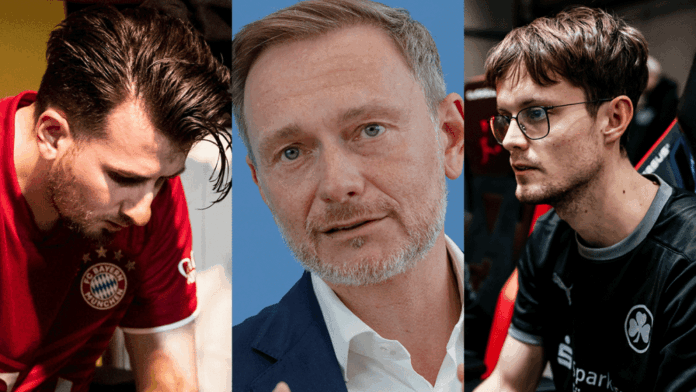2024 is drawing to a close, and eSport looks back on the calendar year. Today, we focus on the scandals of the year.
The political dance around the issue of recognizing eSports as a non-profit is truly not a new phenomenon. For years, there have been promises from virtually every direction. So far, none of them have been kept.
Virtual political disillusionment
In 2024, eSports’ struggle for political recognition reached a low point. Differences between various departments were followed by further grandiose announcements that turned out to be nothing more than hot air just a few months later. The fact that the games department at the Federal Ministry for Economic Affairs also lost its independence in July seemed like a throwback to times long forgotten, and not just to Felix Falk, managing director of the German games industry association game e.V.
What could have been expected at this point ultimately sealed the fate of the traffic light coalition: there is no prospect of eSports being recognized as a non-profit organization for the time being. In six years, none of the governing coalitions has managed to implement this agenda. “A slap in the face” and a “broken promise”, as the chairman of the eSport Association of Schleswig-Holstein, Philipp Ebben, judged.
Cloverleaf in the propaganda trap
In March, the former FC e-sportsman of SpVgg Greuther Fürth, Ajdin Islamovic, caused a political debate of a different nature. His club had withdrawn his license to play in the Virtual Bundesliga at the end of February. An unusual, but not necessarily scandalous, occurrence.
However, the situation became more adventurous when it became clear why the club from Franconia had parted ways with the Austrian. ‘Eyedin98’, as Islamovic calls himself in EA SPORTS FC, had taken part in the “Games of the Future” despite a veto from the club from Franconia. An event in Kazan sponsored by the Russian regime that aimed to combine eSports and real sports.
But that’s not all. Afterwards, the ex-Fürth native not only reaffirmed his decision to call in sick to his employer for the event, but also fell into the eSportswashing trap with his eyes wide open. “I will not report on it,” he let his followers know that there would be no room for critical discussion of sensitive topics in his follow-up reports on Putin’s future games.
Almost-boycott: Messi and Mbappé make FC 24 tremble
Let’s stay with FC 24. In the football simulation, developer EA SPORTS allowed itself another faux pas at the beginning of the year, followed by record-breaking reactions: more than 12,000 comments were posted to an X-Post from the official ‘EA SPORTS FC Direct Communication’ account within a few hours.
But what had happened? In a FUT player choice, the developer had made a mistake in the probabilities of the available items. For about 30 minutes, a flood of the particularly strong, sought-after and expensive TOTY version of Lionel Messi poured over the trading card mode. Then EA SPORTS removed the affected player choice.
The real scandal, however, occurred in the studio’s handling of the momentous mistake, which went down in young FC history as “Messi-Gate”. Because while the favored players were allowed to keep their Messi items, the vast majority of players had to settle for the corrected version of the player choice – and came away empty-handed. A measure that seems a little lacking in fairness.
After this handling was repeated a little later, a boycott was even discussed among the players. In the context of the Ligue 1 TOTS around Kylian Mbappé, EA SPORTS had made a comparable mistake and only escaped the non-observance of the players because the sometimes toxic community attacked each other.
Greenwood’s taste mistake on TikTok
In November, the content creator ‘Ozilla_FC’ also faced attacks. He had presented a video clip to his then approximately 1.9 million followers on TikTok that could hardly be surpassed in terms of tastelessness.
It showed a compilation of highlights with an Olympique Marseille item leveled by Ultimate Team player Mason Greenwood. Greenwood had faced allegations of domestic violence and rape after his partner released a video showing an argument between her and the former Red Devil.
‘Ozilla_FC’ also used this same audio track in his TikTok clip and, with an eye to his goal-scoring ability, also ambiguously dubbed Greenwood the “most dangerous”. A bad joke that was not only met with resentment by numerous social media users. The eSports organization ‘Serious About FIFA’ (SAF) was also not amused by the creator’s questionable sense of humor. Instead, SAF ended its collaboration with him.
VBL Open: The chance for cheaters
However, EA SPORTS has the dubious honor of the biggest scandal of the year. This is because the developer of the series is also responsible for the VBL Open. An open game mode that was billed as an “opportunity for everyone” and represented the first step on the road to the German Individual Championship – but was undermined by cheaters.
Loopholes and a lack of enforcement of existing rules ensured that the selection of qualifiers appeared arbitrary and regularly included cheaters. A competition based on integrity? No longer a given. Which is why FOKUS coach Matthias Hietsch, better known as ‘STYLO’, delivered a harsh verdict: “This has nothing to do with fair play anymore.”
eSport’s extensive research was followed by an announcement from the DFL before the current VBL season that partner EA SPORTS had worked on the deficiencies. The frequently exploited “no-loss glitch” has been fixed, according to the developer, according to the outgoing Head of Virtual Bundesliga, Jörg Höflich.
After the first two qualifying months of the VBL Open in FC 25 have been played, however, the DFL seems to have been tied to a bear here. Furthermore, there are numerous complaints about the supposedly addressed problems. eSports sources confirm this.
So it’s quite possible that EA SPORTS has already booked its place in the review of eSports scandals in 2025.





